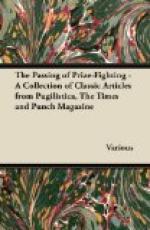Nothing can go beyond this; it proves her beauty and her disinterestedness. The fairest maid might have chosen, nay, commanded, even a city dignitary. Does the so? No; Giles Scroggins, famous only in name, loves her, and—beautiful poetic contrivance!—we are left to imagine he does “not love unloved.” Why should she reciprocate? inquires the reader. Are not truth and generosity the princely paragons of manly virtue, greater, because unostentatious? and these perfect attributes are part and parcel of great Giles. He makes no speeches—soils no satin paper—vows no vows—no, he is above such humbug. His motto is evidently deeds, not words. And what does he do? Send a flimsy epistle, which his fair reader pays the vile postage for? Not he; he
“Gave a ring with posy true!”
Think of this. Not only does he “give a ring,” but he annihilates the suppositionary fiction in which poets are supposed to revel, and the ring’s accompaniment, though the child of a creative brain—the burning emanation from some Apollo-stricken votary of “the lying nine,” imbued with all his stern morality, is strictly “true.” This startling fact is not left wrapped in mystery. The veriest sceptic cannot, in imagination, grave a fancied double meaning on that richest gift. No—the motto follows, and seems to say—Now, as the champion of Giles Scroggins, hurl I this gauntlet down; let him that dare, uplift it! Here I am—
“If you loves I, as I loves you!”
Pray mark the syncretic force of the above line. Giles, in expressing his affection, felt the singular too small, and the vast plural quick supplied the void—Loves must be more than love.
“If you loves I, as I loves you,
No knife shall cut our loves in two!”
This is really sublime! “No knife!” Can anything exceed the assertion? Nothing but the rejoinder—a rejoinder in which the talented author not only stands proudly forward as a poet, but patriotically proves the amor propriae, which has induced him to study the staple manufactures of his beloved country! What but a diligent investigation of the cutlerian process could have prompted the illustration of practical knowledge of the Birmingham and Sheffield artificers contained in the following exquisitely explanatory line. But—pray mark the but—
“But scissors cut as well as knives!”
Sublime announcement! startling information! leading us, by degrees, to the highest of all earthly contemplations, exalting us to fate and her peculiar shears, and preparing us for the exquisitely poetical sequel contained in the following line:—
“And so un_sart_ain’s all our lives.”
Can anything exceed this? The uncertainty of life evidently superinduced the conviction of all other uncertainties, and the sublime poet bears out the intenseness of his impressions by the uncertainty of his spelling! Now, reader, mark the next line, and its context:—




